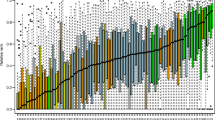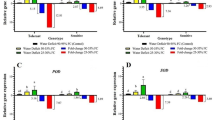Abstract
The optimum development of barley over its life cycle depends on a number of environmental stress factors that can prevent the plant’s expressing its maximum genetic potential. Severe grain losses are often caused by high or low temperatures, drought, anaerobiosis, and such soil anomalies as excess salt. The responses elicited from the plant by these stresses, when not lethal, include alterations in its processes of photosynthesis, respiration, and hormonal regulation through the development of specific, adaptive defense systems and mechanisms that are molecularly controlled. The duration of the stress and the plant’s growth stage at the former’s onset in turn affect yield. One can also find differing reactions as to plant susceptibility to adverse conditions. Thus, genetic variability plays a primary role in determining positive adaptation to environmental stresses and, hence, in supporting the spread of various barley genotypes to extreme climatic conditions (Stanca et al., 1992).
Access this chapter
Tax calculation will be finalised at checkout
Purchases are for personal use only
Preview
Unable to display preview. Download preview PDF.
Similar content being viewed by others
References
Cattivelli L, Bartels D (1989) Cold-induced mRNAs accumulate with different kinetics in barley coleoptiles. Planta 178: 184–188.
Cattivelli L, Bartels D (1990) Molecular cloning and characterization of cold-regulated genes in barley. Plant Physiol 93: 1504–1510.
Cattivelli L, Crosatti C, Grossi M, Pecchioni N, Portesi A, Rizza F, Stanca AM, Terzi V (1991) Molecular response to abiotic stresses in barley. Vortr Pflanzenzuchtg 20: 168–172 /5.
Cattivelli L, Bartels D (1992) Biochemistry and molecular biology of cold-inducible enzymes and proteins in higher plants. In: “Society for Experimental Biology Seminar Series 49: Inducible Plant Proteins” (JL Wray ed.), Cambridge University Press, pp. 267–288.
Chen THH, Gusta LV (1983) Abscisic acid-induced freezing resistance in cultured plant cells. Plant Physiol 73: 71–75.
Chen H-H, Li PH, Brenner ML (1983) Involvement of abscisic acid in potato cold acclimation. Plant Physiol 71: 362–365.
Cloutier Y (1987) Lipid and protein changes in cold- and drought-hardened cereals. Phytoprotection 68: 87–96.
Dunn MA, Hughes MA, Pearce R.S, Jack PL (1990) Molecular characterization of a barley gene induced by cold treatment, J Exp Bot 41: 1405–1413.
Dunn MA, Hughes MA, Zhang L, Pearce RS, Quigley AS, Jack PL (1991) Nucleotide sequence and molecular characterization of the low temperature induced cereal gene, BLT4. Mol Gen Genet 229: 389–394.
Griffith M, Ala P, Yang DSC, Hon W-C, Moffatt B (1992) Antifreeze protein produced endogenously in winter rye leaves. Plant Physiol 100: 593–596.
Grossi M, Cattivelli L, Terzi V, Stanca AM (1992) Modification of gene expression induced by ABA, in relation to drought and cold stress in barley shoots. Plant Physiol Biochem 30 (1): 97–103.
Guy CL (1990) Cold acclimation and freezing stress tolerance: role of protein metabolism. Ann Rev Plant Physiol Plant Mol Biol 41: 187–223.
Hajela RK, Horvath DP, Gilmour SJ, Thomashow MF (1990) Molecular cloning and expression of cor (cold-regulated) genes in Arabidopsis thaliana. Plant Physiol 93: 1246–1252.
Heino P, Sandman G, Lang V, Nordin K, Palva ET (1990) Abscisic acid deficiency prevents development of freezing tolerance in Arabidopsis thaliana ( L.) Heynh. Theor Appl Genet 79: 801–806.
Hughes MA, Pearce RS (1988) Low temperature treatment of barley plants causes altered gene expression in shoot meristems. J Exp Bot 39: 1461–1467.
Kolar SC, Hayes PM, Chen THH, Linderman RG (1991) Genotypic variation for cold tolerance in winter and facultative barley. Crop Sci. 31: 1149–1152.
Kurkela S, Franck M (1990) Cloning and characterization of a cold- and ABA-inducible Arabidospis gene. Plant Mol Biol 15: 137–144.
Levitt J (ed) (1980) Responses of Plants to Environmental Stresses, Vol. I, Chilling, Freezing, and High Temperature Stresses. Academic Press, Orlando FL.
Livingston III DP, Olien CR, Freed RD (1989) Sugar composition and freezing tolerance in barley crowns at varying carbohydrate levels. Crop Sci. 29: 1266–1270.
Lynch DV, Steponkus PL (1987) Plasma membrane lipid alterations associated with cold acclimation of winter rye seedlings (Secale cereale L. cv Puma ). Plant Physiol. 83: 761–767.
Marmiroli N, Terzi V, Odoardi Stanca M, Lorenzoni C, Stanca AM (1986) Protein synthesis during cold shock in barley tissues. Theor Appl Genet 73: 190–196.
Olien CR (1979) Physiology of winter hardiness in barley, Barley. USDA Agric. Handb. 338, Washington D.C., pp. 147–154.
Schindelin H, Marahiel MA, Heinemann U (1993) Universal nucelic acid-binding domain revealed by crystal structure of the B_s_ subtilis major cold-shock protein. Nature 364: 164–168.
Schnuchel A, Wiltscheck R, Czisch M, Herrier M, Willimsky G, Graumann P, Marahiel MA, Holak TA (1993) Structure in solution of the major cold-shock protein from Bacillus subtilis. Nature 364: 169–171.
Skriver K, Mundy J (1990) Gene expression in response to abscisic acid and osmotic stress. The Plant Cell 2: 503–512.
Stanca AM, Terzi V, Cattivelli L (1992) Biochemical and molecular studies of stress tolerance in barley. In: “Barley: genetics, biochemistry, molecular biology and biotechnology” ( P.R. Shewry ed.), C.A.B. International, Wallingford UK, pp. 277–288.
Sutka J, Snape JW (1989) Location of a gene for frost resistance on chromosome 5A of wheat. Euphytica 42: 41–44.
Thomashow MF (1990) Molecular genetics of cold acclimation in higher plants. Adv in Genet 28: 99–131.
Author information
Authors and Affiliations
Editor information
Editors and Affiliations
Rights and permissions
Copyright information
© 1994 Springer-Verlag Berlin Heidelberg
About this paper
Cite this paper
Cattivelli, L. et al. (1994). Molecular Analysis of Cold-Hardening in Barley. In: Cherry, J.H. (eds) Biochemical and Cellular Mechanisms of Stress Tolerance in Plants. NATO ASI Series, vol 86. Springer, Berlin, Heidelberg. https://doi.org/10.1007/978-3-642-79133-8_31
Download citation
DOI: https://doi.org/10.1007/978-3-642-79133-8_31
Publisher Name: Springer, Berlin, Heidelberg
Print ISBN: 978-3-642-79135-2
Online ISBN: 978-3-642-79133-8
eBook Packages: Springer Book Archive




